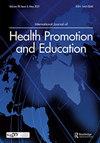Digital implementation of originally school-based stroke educational programme in Greece due to the COVID-19 pandemic
IF 0.7
Q3 EDUCATION, SCIENTIFIC DISCIPLINES
International Journal of Health Promotion and Education
Pub Date : 2022-05-17
DOI:10.1080/14635240.2022.2073552
引用次数: 2
Abstract
ABSTRACT This paper describes the digitalization process of an originally school-based educational programme to an online version and confirms its efficacy on teaching young children as well as their parents about stroke symptoms and the necessary actions needed to be taken in the event of a stroke. Forty children (20 children with neurodevelopmental disorders (NDDs) and 20 without NDDs), aged 4–9 years, as well as 35 of these children’s parents (30–50 years old) participated in the study in Greece. All individuals watched 5 educational videos, designed and produced by the Super Grand League Team. Each video had a mean duration of 15 minutes. Most children had no prior knowledge neither in stroke symptoms nor to the appropriate actions after a stroke. Children’s knowledge of stroke symptoms (except the symptom of speech disturbance) and the appropriate actions following stroke improved significantly immediately post training (p < 0.05). Children with NDDs demonstrated no significant differences when compared to their peers without NDDs in regards to the knowledge gains. In the same line, parents showed a significant increase in their knowledge as regards the stroke symptoms (p < 0.001). Only 2 parents (5.7%) knew the correct emergency number before participating in the online programme, while all of them (100%) responded correctly after the programme. The current work using multimodal remote education demonstrates significant improvement in learning about stroke symptomatology and the necessary steps that need to follow. Future work should evaluate the impact of digital interventions in respect of onset-to-door times and stroke outcomes.由于COVID-19大流行,希腊最初以学校为基础的中风教育计划的数字化实施
摘要本文描述了一个最初以学校为基础的教育计划到在线版本的数字化过程,并证实了它在向幼儿及其父母传授中风症状和中风时需要采取的必要行动方面的有效性。40名4-9岁的儿童(20名患有神经发育障碍(NDD)的儿童和20名没有NDD的儿童)以及其中35名儿童的父母(30-50岁)在希腊参加了这项研究。所有人观看了由超级联赛球队设计和制作的5个教育视频。每个视频的平均持续时间为15分钟。大多数儿童既不了解中风症状,也不了解中风后的适当行动。训练后,儿童对中风症状(言语障碍症状除外)和中风后适当行动的了解立即显著改善(p<0.05)。与没有NDD的同龄人相比,患有NDD的儿童在知识获得方面没有显著差异。同样,家长对中风症状的了解显著增加(p<0.001)。只有2名家长(5.7%)在参加在线课程之前知道正确的急救电话,而所有家长(100%)在课程结束后都做出了正确的反应。目前使用多模式远程教育的工作表明,在学习中风症状学和需要遵循的必要步骤方面有了显著改善。未来的工作应该评估数字干预对发病时间和中风结果的影响。
本文章由计算机程序翻译,如有差异,请以英文原文为准。
求助全文
约1分钟内获得全文
求助全文
来源期刊

International Journal of Health Promotion and Education
EDUCATION, SCIENTIFIC DISCIPLINES-
CiteScore
2.30
自引率
10.00%
发文量
69
 求助内容:
求助内容: 应助结果提醒方式:
应助结果提醒方式:


